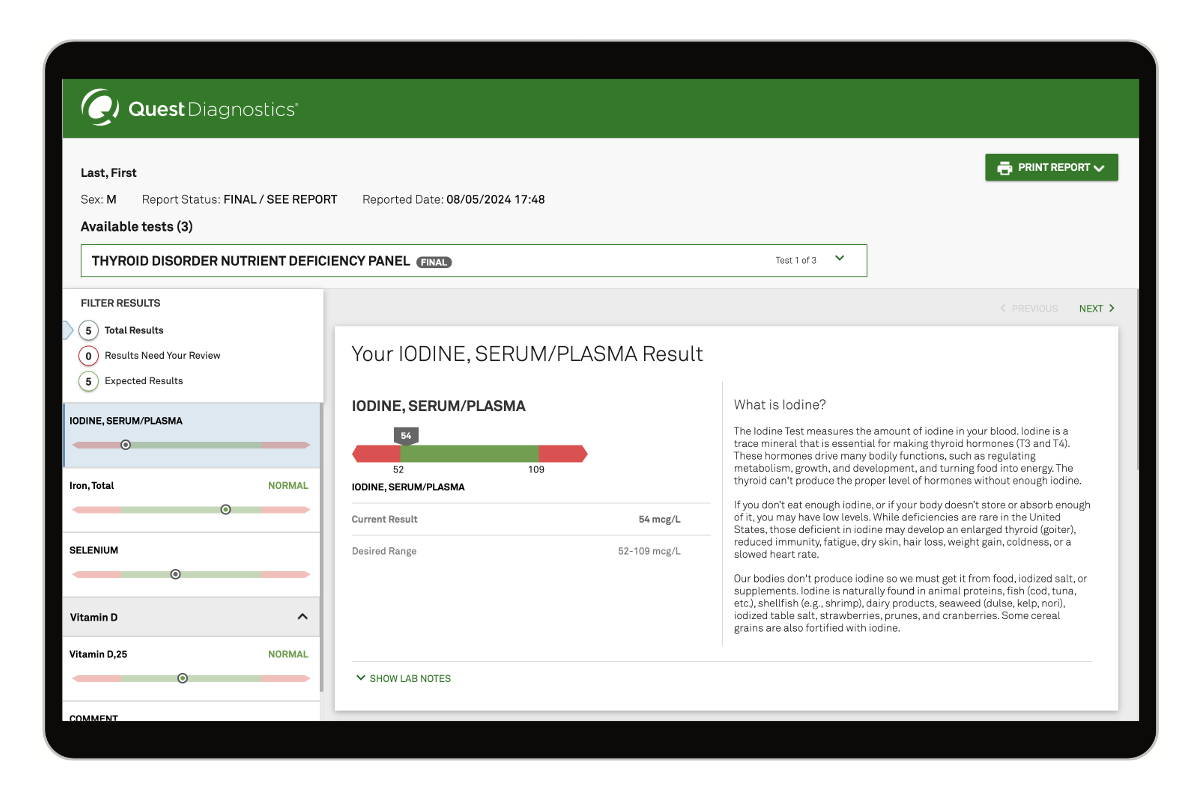Thyroid Disorder Nutrient Deficiency Test Panel
Thyroid disorders, such as hypothyroidism and Hashimoto’s, may make it difficult for your body to get the nutrients it needs. Measure the levels of 5 nutrients in your blood that research has shown can be affected by thyroid disorders. Read moreThe Thyroid Disorder Nutrient Deficiency Panel measures the levels of the following 5 nutrients in your blood: vitamin D, iodine, ferritin, iron, and selenium.
Identifying and addressing nutrient deficiencies are important steps toward better health. Your body does not produce most vitamins and minerals, so you must get them from food or supplements. How nutrients work in your body is influenced by more than just what you eat. These factors include genetics, age, health conditions, medications, metabolism, and how well your body absorbs nutrients.
Thyroid disorders, such as hypothyroidism and Hashimoto’s, may make it difficult to get the nutrients your body needs. Having these nutrients tested helps you and your doctor decide if you need to supplement them with additional vitamins or minerals.
How it works
questhealth.com offers 100+ consumer-initiated Quest Diagnostics lab tests to empower you to have more control over your health journey. Choose from a variety of test types that best suit your needs.
If your body is not absorbing certain nutrients properly, your doctor may suggest you consider taking a supplement for that nutrient.
While it is unlikely to get too much of a nutrient if you are taking a supplement, getting too much, known as toxicity, is possible. It's recommended to confirm a deficiency through testing and talk with your doctor prior to taking supplements.
Water-soluble and fat-soluble vitamins differ in how they are absorbed by the human body.
A water-soluble vitamin dissolves in water and is easily absorbed by the body. Your body does not store these vitamins for long, so any extra will be eliminated in your urine. Because of this, it's important to consume them every day.
A fat-soluble vitamin dissolves in fats and oils and is absorbed with the fats you eat. Your body stores any extra in your liver or fatty tissues. Because of this, you don't need to consume them every day.
- 1Triggiani V, Tafaro E, Giagulli VA, et al. Role of iodine, selenium and other micronutrients in thyroid function and disorders. Endocrine, Metabolic & Immune Disorders - Drug Targets. 9(3):277-294. Accessed April 14, 2022. https://www.eurekaselect.com/article/29804
- Liontiris MI, Mazokopakis EE. A concise review of Hashimoto thyroiditis (Ht) and the importance of iodine, selenium, vitamin D and gluten on the autoimmunity and dietary management of HT patients. Points that need more investigation. Hell J Nucl Med. 2017;20(1):51-56. doi:10.1967/s002449910507
- Rayman MP. Multiple nutritional factors and thyroid disease, with particular reference to autoimmune thyroid disease. Proceedings of the Nutrition Society. 2019;78(1):34-44. doi:10.1017/S0029665118001192



